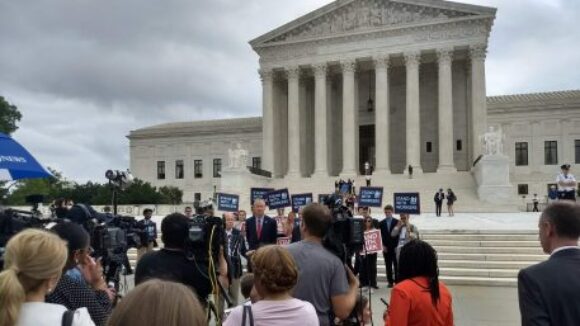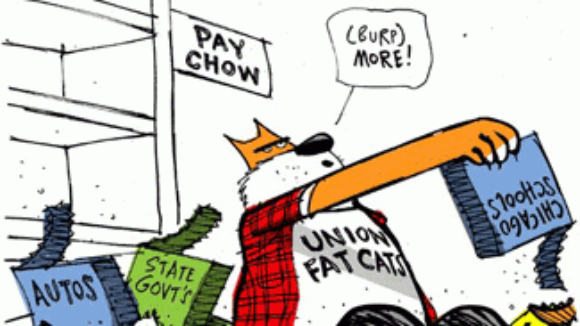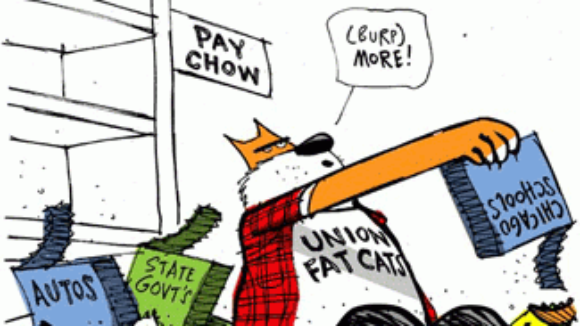Teachers File Lawsuit Against Union for Trapping Them in Dues
The lawsuit challenges a union boss-created “escape period” scheme that blocks teachers from terminating dues deductions from their paychecks...

The lawsuit challenges a union boss-created “escape period” scheme that blocks teachers from terminating dues deductions from their paychecks...
Foundation President Mark Mix recently participated in a panel discussion titled “Ask The Experts: Teacher Appreciation Week? How Teachers Unions Got in the Way.”

Matt Kibbe looks at why the "resolution" of the teacher's strike in Chicago is not in the best interests of the children and taxpayers of the state: The Chicago Teachers Union Strike may be resolved for now, but the events illustrate a serious problem facing the United States: union bosses are manipulating government leaders, using teachers and students as human shields in their fight to maintain power over the educational system. Their stranglehold on education has to end if our children are to have any hope of getting the education they need to compete in the world. [media-credit name=" " align="aligncenter" width="300"][/media-credit]Teacher pay got a lot of attention in coverage of the debate, but it was far from the only issue at play in the strike, which ended Wednesday under the promise of a resolution that appeased the union bullies. The primary disagreements were over who has the power to hire and fire teachers, and accountability for student performance. The union insisted that it should have the right to dictate who gets hired to fill jobs in the district. Primarily, it wanted to take hiring authority away from school principals by requiring that laid-off teachers be hired back. Union leaders also rejected the perfectly reasonable demand from the city of Chicago that standardized test scores play a role in evaluating teacher performance. A roofer is judged by how well his shingles keep out the rain. A CFO is judged by her company’s balance sheet. A journalist is judged by the accuracy and fairness of his story. Yet somehow union leaders think teachers shouldn’t be judged by the outcome of their work. Teachers’ unions exist to promote what’s best for teachers, not students. As Albert Shanker, the late president of the American Federation of Teachers, once reportedly put it, “When schoolchildren start paying union dues, that’s when I’ll start representing the interests of schoolchildren.” (Shanker’s supporters dispute that he said this, but the quotation’s staying power illustrates the accuracy with which it represents union motives.) Because they exist to protect the status quo, unions oppose the kind of meaningful education reform America needs. They oppose education tax credits, school vouchers, charter schools, merit pay, and virtually all attempts to impose real accountability. They instead support a system that sees the United States spending nearly two and a half times more per pupil today than in 1970. What have we received in return? Stagnant math and reading scores for 17-year-olds, and a decline in science scores.

Matt Kibbe looks at why the "resolution" of the teacher's strike in Chicago is not in the best interests of the children and taxpayers of the state: The Chicago Teachers Union Strike may be resolved for now, but the events illustrate a serious problem facing the United States: union bosses are manipulating government leaders, using teachers and students as human shields in their fight to maintain power over the educational system. Their stranglehold on education has to end if our children are to have any hope of getting the education they need to compete in the world. [media-credit name=" " align="aligncenter" width="300"][/media-credit]Teacher pay got a lot of attention in coverage of the debate, but it was far from the only issue at play in the strike, which ended Wednesday under the promise of a resolution that appeased the union bullies. The primary disagreements were over who has the power to hire and fire teachers, and accountability for student performance. The union insisted that it should have the right to dictate who gets hired to fill jobs in the district. Primarily, it wanted to take hiring authority away from school principals by requiring that laid-off teachers be hired back. Union leaders also rejected the perfectly reasonable demand from the city of Chicago that standardized test scores play a role in evaluating teacher performance. A roofer is judged by how well his shingles keep out the rain. A CFO is judged by her company’s balance sheet. A journalist is judged by the accuracy and fairness of his story. Yet somehow union leaders think teachers shouldn’t be judged by the outcome of their work. Teachers’ unions exist to promote what’s best for teachers, not students. As Albert Shanker, the late president of the American Federation of Teachers, once reportedly put it, “When schoolchildren start paying union dues, that’s when I’ll start representing the interests of schoolchildren.” (Shanker’s supporters dispute that he said this, but the quotation’s staying power illustrates the accuracy with which it represents union motives.) Because they exist to protect the status quo, unions oppose the kind of meaningful education reform America needs. They oppose education tax credits, school vouchers, charter schools, merit pay, and virtually all attempts to impose real accountability. They instead support a system that sees the United States spending nearly two and a half times more per pupil today than in 1970. What have we received in return? Stagnant math and reading scores for 17-year-olds, and a decline in science scores.
Writing at National Review, Joshua Culling looks at the details of the Chicago teachers deal: During the Democratic National Convention I wrote about a clear contrast between the policies of Illinois natives Barack Obama and Pat Quinn, and their Wisconsin counterparts, Paul Ryan and Scott Walker. We now have another anti-reformer to add to the Illinois column: Chicago mayor Rahm Emanuel. The seven-school-day Chicago Teachers Union strike was extensively covered across the country, as teachers walked out of the classroom after rejecting a deal with the city that would have paid them 16 percent more over four years, coupled with a slightly greater weighting of student performance in teacher evaluations. So far as I could tell, the union’s choice was overwhelmingly portrayed in a negative light, with even the New York Times editorial page calling the strike “unnecessary,” positing that union president Karen Lewis “seem[ed] to be basking in the power of having shut down the school system.” It was an opportunity for Emanuel to take a politically popular stand against union largesse while winning serious reforms for his city’s beleaguered budget. It is sad but true that when Democratic leaders push back against unions, they are applauded for moderation, or at least left alone by observers in the media. In 2011, Massachusetts governor Deval Patrick and an overwhelmingly Democratic legislature curbed collective bargaining to little fanfare. At the same time, Wisconsin governor Scott Walker pursued a similar path in Madison, but faced thousands of union protesters at his doorstep and the wrath of the New York Times and MSNBC.
[stream provider=youtube flv=OdREEcx0-Qc img=x:/nrtwc.org/wp-content/uploads/2012/04/giveupthebucksteacher.png embed=false share=false width=550 height=345 dock=true controlbar=over bandwidth=high autostart=false /] Teachers at more than 200 Chicago schools overwhelmingly favor a plan to walk off the job in protest, Chicago Teachers Union Boss Karen Lewis said. Lewis…
[stream provider=youtube flv=OdREEcx0-Qc img=x:/nrtwc.org/wp-content/uploads/2012/04/giveupthebucksteacher.png embed=false share=false width=550 height=345 dock=true controlbar=over bandwidth=high autostart=false /] Teachers at more than 200 Chicago schools overwhelmingly favor a plan to walk off the job in protest, Chicago Teachers Union Boss Karen Lewis said. Lewis…